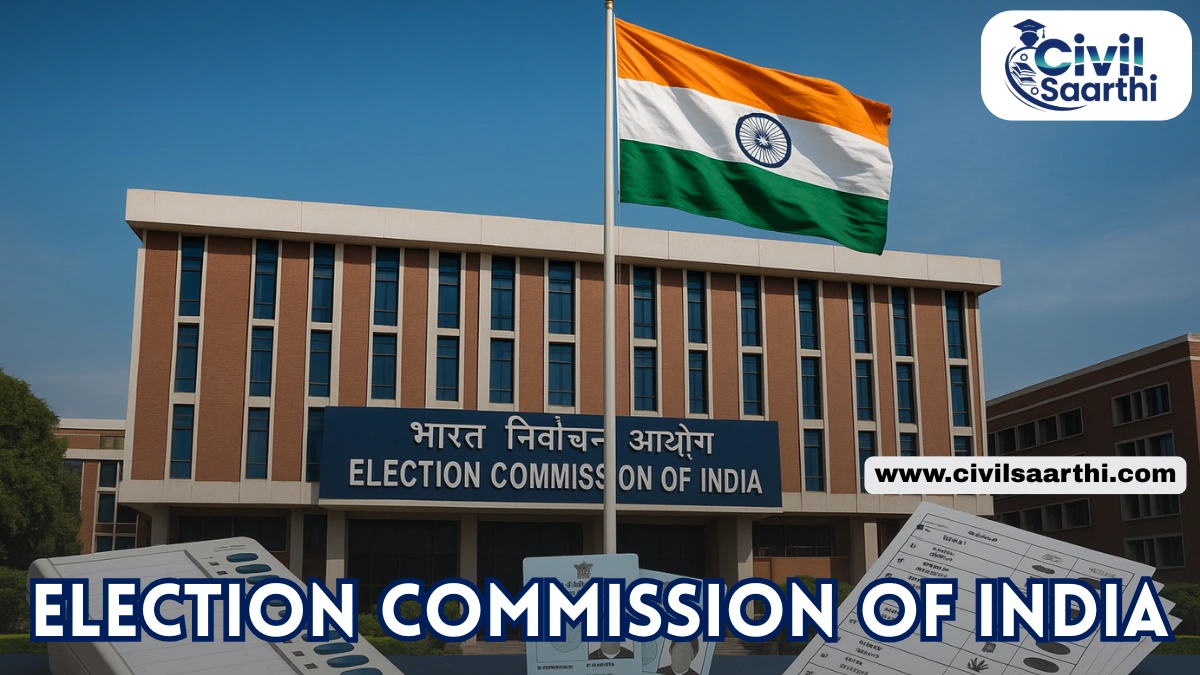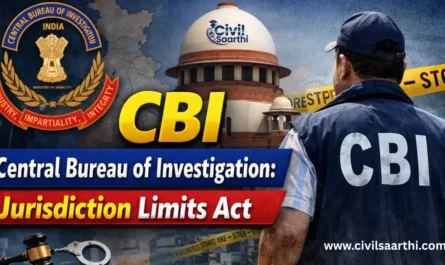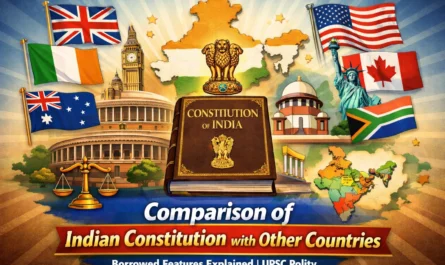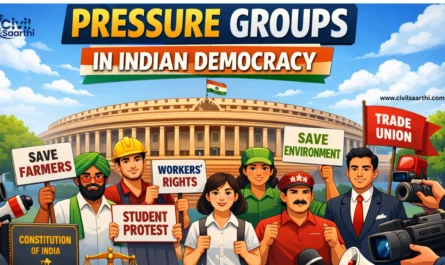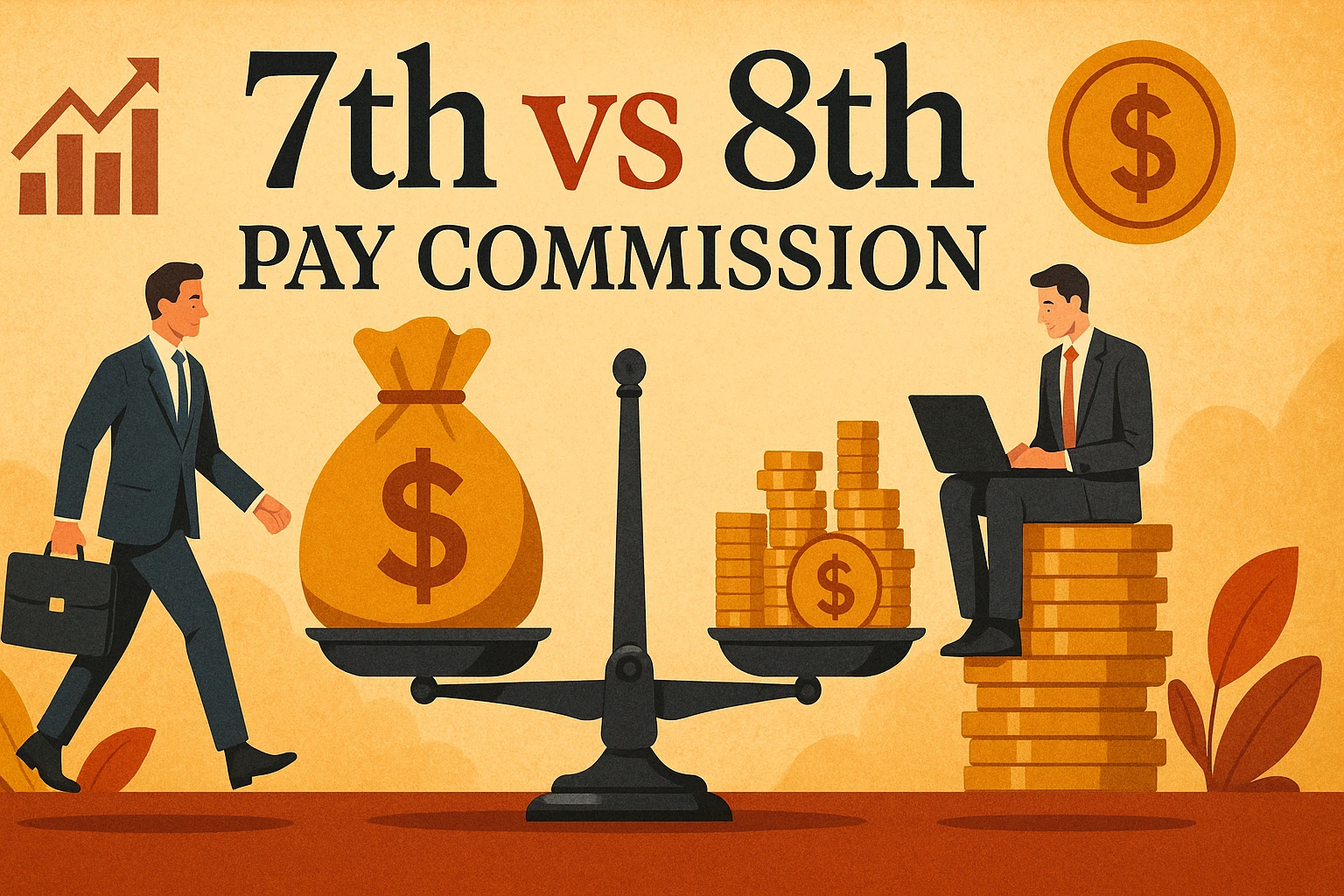The Election Commission of India (ECI) is a constitutional body responsible for free and fair elections in the country. Established under Article 324 of the Constitution, it plays a vital role in maintaining the integrity of the electoral process. The Election Commission of India conducts elections to the Parliament, State Legislatures, and the offices of the President and Vice-President. Its impartiality, autonomy, and wide-ranging powers make the Election Commission of India a cornerstone of Indian democracy. This is one of the important topic which might be asked in UPSC Prelims and Mains Exam.
Election Commission of India
The Election Commission of India (ECI) is an autonomous constitutional authority tasked with conducting and regulating elections in India. It ensures elections are conducted in a free, fair, and transparent manner. First established in 25 January, 1950, the Election Commission of India has evolved into a powerful three-member body entrusted with implementing the Model Code of Conduct, overseeing political parties, and managing electoral rolls. It plays a vital role in upholding the democratic values enshrined in the Constitution.
Election Commission of India: Overview
The Election Commission of India is constituted under Article 324 of the Constitution and is responsible for supervising, directing, and controlling the entire election process. Originally a single-member body, it became a multi-member commission in 1993. The Election Commission of India operates independently of the executive, and its decisions are binding on political parties and candidates. It has sweeping powers to ensure law and order during polls, limit expenditure, and take action against electoral malpractices.
Election Commission of India: Overview | |
| Feature | Details |
| Established Under | Article 324 of the Constitution |
| First Established | 25 January 1950 |
| Type | Constitutional Body |
| Composition | Chief Election Commissioner + 2 Election Commissioners |
| Tenure | 6 years or until 65 years of age (whichever is earlier) |
| Jurisdiction | Elections to Parliament, State Assemblies, President, Vice-President |
Constitutional Provisions & Articles Related to Election Commission of India
The powers and responsibilities of the Election Commission of India are derived mainly from Article 324 to Article 329 of the Indian Constitution. These articles provide the legal foundation for conducting elections and resolving disputes related to electoral processes. The Election Commission of India has the authority to supervise elections to the offices of President, Vice-President, and to both Houses of Parliament and State Legislatures.
Election Commission of India: Constitutional Provisions and Articles | |
| Article | Provision |
| 324 | Superintendence, direction, and control of elections |
| 325 | Universal adult suffrage without discrimination |
| 326 | Elections to be based on adult suffrage |
| 327 | Power of Parliament to make provisions related to elections |
| 328 | Power of State Legislature to make provisions |
| 329 | Bar on interference by courts in electoral matters |
Election Commission of India: Composition and Appointment
The Election Commission of India consists of the Chief Election Commissioner (CEC) and two other Election Commissioners. Initially comprising only the CEC, the body was made multi-member in 1993 to improve electoral oversight. Members of the Election Commission of India are appointed by the President and hold office for six years or until the age of 65.
Composition
Initially: Single-member body (only Chief Election Commissioner).
- Since 1989: Multi-member body: CEC + up to two Election Commissioners.
- Presently: One CEC and two ECs.
Appointment Process
Pre-2023: Appointment by President on advice of Council of Ministers.
Post-2023: President appoints on recommendation of Selection Committee:
- Prime Minister – Chairperson
- Leader of Opposition in Lok Sabha – Member
- Union Cabinet Minister nominated by PM – Member
Appointment Authority
- President of India.
- Governed by the Constitution and the CEC and Other ECs (Appointment, Conditions of Service and Term of Office) Bill, 2023
Election Commission of India: Term of Office
The Chief Election Commissioner and Election Commissioners hold office for a term of six years or until they reach the age of 65 years, whichever comes first. While Election Commissioners can be elevated as CEC, a CEC cannot be reappointed to the same position after completing the term.
Election Commission of India: Salary and Allowance
The salary and allowances of the Chief Election Commissioner and other Election Commissioners are equivalent to those of a Supreme Court judge, as provided under the Election Commission (Conditions of Service of Election Commissioners and Transaction of Business) Act, 1991. These include salary, dearness allowance, leave, pension, and other perks, which cannot be varied to their disadvantage after appointment. This parity ensures dignity of office and safeguards the independence of the Election Commission.
Election Commission of India: Removal
The Chief Election Commissioner (CEC) can be removed from office in the same manner and on the same grounds as a Supreme Court judge, requiring a special majority in both Houses of Parliament on grounds of proved misbehavior or incapacity. Election Commissioners (ECs), however, do not have this same level of protection and can be removed by the President on the recommendation of the CEC. This ensures independence for the CEC while maintaining accountability for other members.
Election Commission of India: Powers and Functions
The Election Commission of India is endowed with vast powers to ensure free and fair elections. These powers extend to preparing electoral rolls, supervising polling booths, enforcing the Model Code of Conduct, and declaring results. The Election Commission of India also monitors election expenditure and ensures compliance with electoral laws.
1. Constitutional and Legal Powers
- Derived mainly from Article 324 of the Constitution, which grants the ECI superintendence, direction, and control over the preparation of electoral rolls and the conduct of elections.
- Empowered to function independently without interference from the executive.
- Can issue binding instructions to both Central and State governments for smooth conduct of elections.
2. Administrative Functions
- Election Management – Organises elections to Lok Sabha, Rajya Sabha, State Legislative Assemblies, and the offices of President and Vice-President.
- Electoral Roll Maintenance – Prepares, revises, and updates electoral rolls for all constituencies.
- Recognition of Political Parties – Grants recognition to political parties and allots election symbols.
- Monitoring Election Expenditure – Sets spending limits and monitors candidates’ accounts.
3. Quasi-Judicial Functions
- Decides disputes related to recognition and de-recognition of political parties.
- Resolves conflicts over the allotment of symbols between parties or factions.
- Adjudicates on the disqualification of members of Parliament and State Legislatures in consultation with the President or Governor, as the case may be.
4. Advisory Functions
- Advises the President on disqualification of MPs under Articles 103 and 329.
- Advises the Governor on disqualification of MLAs under Article 192.
- Consults with the Supreme Court or High Courts where required.
5. Regulatory and Enforcement Powers
- Enforces the Model Code of Conduct (MCC) during elections to ensure free and fair polls.
- Monitors media coverage to prevent paid news and misuse of government machinery.
- Can order repolls or countermand elections in case of malpractice or violence.
6. Investigative and Disciplinary Powers
- Can send election observers to constituencies to report on poll fairness.
- Can take disciplinary action against election officials for misconduct.
- Refers cases of criminal violations of election law to relevant authorities for prosecution.
7. Miscellaneous Functions
- Conducts voter awareness campaigns (SVEEP – Systematic Voters’ Education and Electoral Participation).
- Facilitates voting for persons with disabilities, senior citizens, and service voters.
- Introduces technology in voting, such as Electronic Voting Machines (EVMs) and Voter Verifiable Paper Audit Trail (VVPAT).
Election Commission of India: Independence and Autonomy
The Election Commission of India is designed to function independently of the executive to ensure neutrality. Its expenditures are charged on the Consolidated Fund of India. The Chief Election Commissioner cannot be removed except through impeachment, thereby securing autonomy. This insulation from political influence is key to the credibility of the Election Commission of India.
- The Chief Election Commissioner enjoys the same security of tenure as a Supreme Court judge, and can only be removed through a special majority in Parliament on proven grounds of misbehavior or incapacity.
- The service conditions of the CEC and Election Commissioners cannot be varied to their disadvantage after appointment, ensuring protection from executive influence.
- The Election Commission has full control over staff deputed for election duties, including disciplinary powers during the election period.
- It is vested with plenary powers under Article 324, allowing it to take decisions in areas where the law is silent to ensure free and fair elections.
- The Model Code of Conduct and power to countermand polls in cases of malpractice give it operational autonomy over the election process.
Election Commission of India: Model Code of Conduct
The Election Commission of India enforces the Model Code of Conduct (MCC) to regulate political parties and candidates before elections. The MCC ensures level playing ground by prohibiting hate speech, bribery, misuse of government machinery, and declaring promises that influence voters. Though not legally binding, the MCC is strictly enforced by the Election Commission of India.
- General Conduct: No use of caste, religion, or communal sentiments to secure votes; no bribery, intimidation, or hate speeches.
- Meetings: Prior permission from authorities for rallies and meetings; no obstruction of traffic or inconvenience to the public.
- Processions: Routes must be pre-approved; no armed processions; avoid clashes with other groups.
- Polling Day Guidelines: No canvassing within 100 metres of polling stations; no intimidation of voters.
- Party in Power: Ministers and ruling parties cannot use official machinery, funds, or government resources for campaigning.
- Election Manifestos: Must not make promises that vitiate the level playing field; avoid measures that may unduly influence voters.
Recent Landmark SC Judgments on Election Commission of India
1. Anoop Baranwal Case (2023)
The Supreme Court ruled that, until Parliament enacts a law, the Chief Election Commissioner and Election Commissioners must be appointed by the President on the advice of a committee consisting of the Prime Minister, Leader of the Opposition in Lok Sabha, and the Chief Justice of India. This aimed to safeguard the ECI’s independence.
2. Challenge to the 2023 Appointment Law (2024)
A petition challenged the new law replacing the CJI with a Union Minister in the selection committee. The Court declined to stay the law before the General Elections, citing timing, but agreed to hear the case on merits later.
3. Bihar Electoral Roll Revision Case (2025)
The Court allowed the ECI to continue the Special Intensive Revision of electoral rolls but directed it to consider using multiple ID proofs like Aadhaar, voter ID, and ration card. It also ordered the ECI to explain the removal of around 65 lakh voters, stressing transparency and fairness.
Election Commission of India: Challenges and Reforms
While the Election Commission of India is among the most trusted institutions, it faces challenges like lack of transparency in appointments, delay in disqualifying MPs/MLAs, and inability to act against parties violating MCC. Reforms have been suggested by committees and civil society to strengthen the Election Commission of India.
Challenges
- Appointment Process Concerns – Earlier appointments were solely based on executive discretion, raising questions about neutrality and transparency.
- Allegations of Partisanship – Perceptions of bias in handling violations of the Model Code of Conduct and election-related disputes.
- Limited Legal Backing for MCC – The Model Code of Conduct is not legally enforceable, reducing its deterrent effect.
- Influence of Money and Muscle Power – Rampant use of black money, freebies, and criminal elements in elections undermines fair play.
- Technological Concerns – Allegations and skepticism regarding Electronic Voting Machines (EVMs) and VVPAT transparency.
- Election Expenditure Oversight – Difficulty in tracking real spending by candidates, leading to underreporting and violations.
Reforms Suggested
- Transparent Collegium for Appointments – Strengthen the new selection committee process with broader representation, possibly including judiciary.
- Legal Status to MCC – Enact a law to make MCC provisions enforceable with penalties.
- State Funding of Elections – Reduce dependence on private funding and curb corruption.
- Stronger Monitoring Mechanisms – Enhance use of technology for real-time tracking of election expenses and poll violations.
- Enhanced VVPAT Verification – Increase random VVPAT counting to boost transparency and public trust.
- Permanent Independent Secretariat – Create a separate cadre and budget for ECI to reduce dependence on executive machinery.
Election Commission of India FAQs
What is the role of the Election Commission of India?
The Election Commission of India supervises, directs, and controls elections in India to ensure they are free and fair.
Under which Article is the Election Commission of India established?
The Election Commission of India is established under Article 324 of the Indian Constitution.
How many members are there in the Election Commission of India?
The Election Commission of India currently consists of three members – the Chief Election Commissioner and two Election Commissioners.
Can the Election Commission of India disqualify a candidate?
Yes, the Election Commission of India can recommend disqualification under various provisions like corrupt practices, election offenses, and the Tenth Schedule.
Is the Model Code of Conduct legally enforceable?
No, the MCC enforced by the Election Commission of India is not a law but is treated with seriousness and backed by moral and constitutional authority.
How is the Chief Election Commissioner removed?
The Chief Election Commissioner can only be removed like a Supreme Court Judge through a process of impeachment by Parliament.
Does the Election Commission of India handle local elections?
No, local body elections are conducted by the State Election Commissions, not the Election Commission of India.

